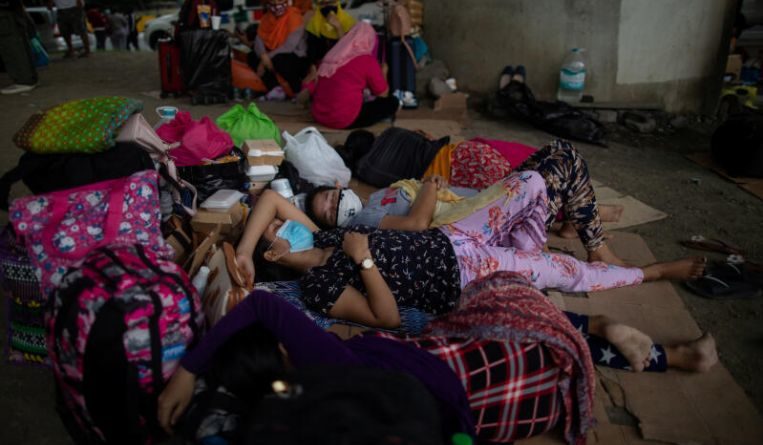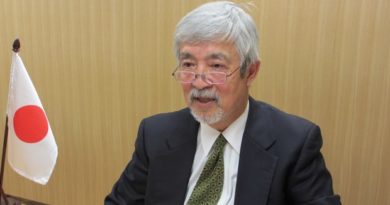COVID-19 PANDEMIC: Pandemic has made overseas Filipino workers even more vulnerable
MANILA – For three months, he hasn’t been paid, and he hasn’t been getting any food rations for weeks. So, Mr Pablito de Ocampo and about 10 of his fellow laid-off workers at a firm in Riyadh, Saudi Arabia, headed to the back of a nearby mall very early one recent morning, just before the garbage trucks arrived. There, they rummaged through the rubbish to look for something still edible, like a slightly damaged carrot.
.


.
“We gathered rejects because we don’t know where else to go to get something to eat,” Mr de Ocampo, 33, an aluminium installer at Alumatec Aluminium Manufacturers, told The Straits Times via a video call.
He is one of the tens of thousands of Filipinos in Saudi Arabia desperate to head home because they have lost their jobs, and they are being overlooked in a coronavirus-ravaged nation that does not see them right now as a priority concern.
The Philippines’ army of overseas workers have long been hailed as “unsung heroes” for their billions worth of remittances that have kept the Philippine economy afloat, even as financial crises battered other nations.
Remittances by some 10 million Filipinos living abroad reached a record high of US$33.5 billion (S$46.5 billion) last year.
But overseas Filipino workers have also been the most vulnerable, often discriminated against and given little protection in countries where they work.
Maids have been reported to betreated worse than dogs, and construction workers are paid less than what they were promised, if they are paid at all.
The coronavirus pandemic has made them even more vulnerable.
Nurses are called to the frontlines with little or no protection. Dozens have died in the United States and Britain.
Waiters, hotel staff, entertainers, salesmen, clerks and labourers are the first to be laid off or furloughed without guarantees of compensation or some form of safety net in the Gulf states.
“After using us and calling us ‘heroes’, why can’t they help us now that we need it most?” asked Mr de Ocampo of the Philippine authorities.
.


.


.
Perhaps nowhere is the situation more dire than in Saudi Arabia.
Saudi Arabia has the highest number of overseas Filipinos with Covid-19 – nearly 4,000. At least 100 have died due to Covid-19, the disease the virus causes.
Among them was Mr Ruperto Llorando, 55, an engineer who had been working in Saudi Arabia for 12 years and was supposed to be on his last year there, and had been planning to stay for good in the Philippines.
Now, not even his remains may make it back home. Embassy officials have decided to bury those who have died in Saudi Arabia because there are not enough flights to take all the bodies back to the Philippines.
Philippine Ambassador to Saudi Arabia Adnan Alonto said on Monday (June 22) he had received reports that some 240 more Filipinos also died in recent months, but these were due to “natural causes”, not Covid-19.


.
Among those who died of a “natural cause” was Mr Jeffrey Yape, who worked at the same firm as Mr de Ocampo.
He died of a heart attack on May 21. But Mr de Ocampo and those he shared a dormitory with believe Mr Yape’s heart stopped because he could no longer deal with the stress, anxiety, desperation and loneliness he was experiencing.
“He died of a broken promise: that he will be sent home,” said Mr Louis Perez, a close friend of Mr Yape’s.
Mr Perez said their company had been missing salary payments since last year. In February, it stopped paying them altogether.
They were promised in talks brokered by the Philippine embassy that they would be paid till April 15, and then sent back to the Philippines, he said.
But then, the pandemic hit Saudi Arabia, in early March. All 400 Filipino workers at the aluminium firm were told to stay inside their dormitories. There was no work, so they were not paid.
.


.


.
Their company rationed food, but it was never enough. The embassy also gave food packs of rice, canned goods and toiletries. But after an initial bonanza in the first month, the supplies gradually petered out, till they were not receiving anything any more in past weeks.
That was when some of them decided to hit the rubbish bins.
Mrde Ocampo said they are all now without money, always hungry and terrified of getting sick.
They know hospitals will turn them away if they have high fever, coughing or any symptoms of Covid-19 “because we are not Saudi citizens”, he said.
Getting to a hospital or a clinic itself is a challenge because they don’t have money for cab fare. All they can do is call the embassy and hope a vehicle will pick them up.
“The hospitals here really won’t admit you, especially if you’ve had a fever for a couple of days already. They’re following protocols. They’ll just give you a prescription,” said Mr Phylbert Oasay, 33, who used to work at a flower shop but ran away to a shelter for distressed migrant workers because his employer was beating him up.
“It’s worse for us who ran away because we don’t have work papers any more,” he added. “We don’t even think about going to a hospital.”
Filipinos have also been hauled to police stations in Saudi Arabia for airing their plight on social media.
.


.
A cleaner who gave her name only as Ruby said she was taken to a police station after her supervisor was unhappy with a Facebook post she wrote complaining about being forced to work without any protection at all against Covid-19.
The Philippine embassy in Riyadh said at least 23,000 Filipinos in Saudi Arabia had asked to be repatriated.
.


.


.
Only 2,000 had been sent home since mid-May, and just 5,000 more had secured exit visas. The rest are still stuck in Saudi Arabia, with no clear way home.
“We just want what is owed us, and then we just want to go home,” said Mr de Ocampo. “We don’t want to die here.”
.


.
Read the latest on the Covid-19 situation in Singapore and beyond on our dedicated site here.
Get The Straits Times app and receive breaking news alerts and more. Download from the Apple App Store or Google Play Store now.


SIGN UP TO RECEIVE OUR EMAIL
.
The most important news of the day about the ASEAN Countries and the world in one email: [email protected]
6.25.2020










